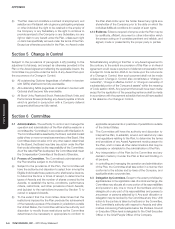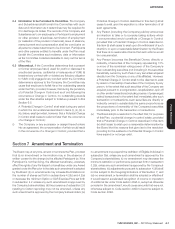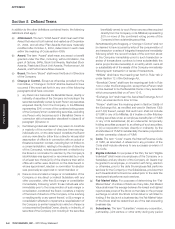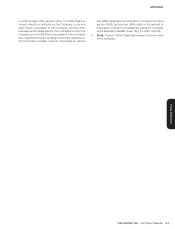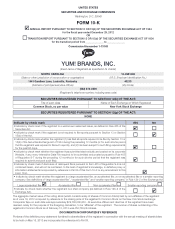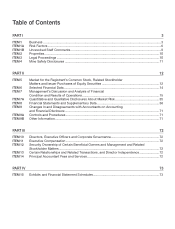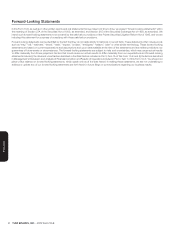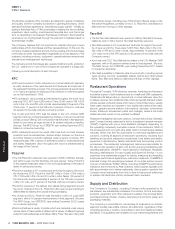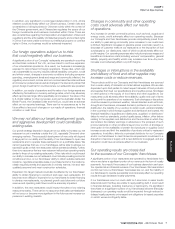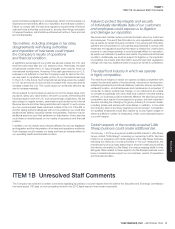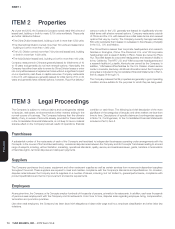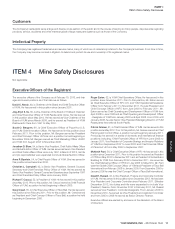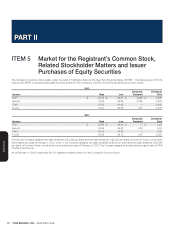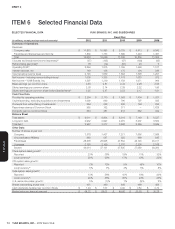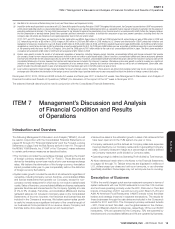Pizza Hut 2012 Annual Report Download - page 97
Download and view the complete annual report
Please find page 97 of the 2012 Pizza Hut annual report below. You can navigate through the pages in the report by either clicking on the pages listed below, or by using the keyword search tool below to find specific information within the annual report.
YUM! BRANDS, INC.-2012 Form10-K 5
Form 10-K
PART I
ITEM 1Business
regulations where appropriate and without compromising the standards.The
Company has not experienced any signifi cant continuous shortages of
supplies, and alternative sources for most of these products are generally
available.Prices paid for these supplies fl uctuate.When prices increase,
the Concepts may attempt to pass on such increases to their customers,
although there is no assurance that this can be done practically.
China Division In China, we work with approximately 650 independent
suppliers, mostly China-based, providing a wide range of products. We own
most of the distribution system which includes approximately 20 logistics
centers. We also own a non-controlling interest in a meat processing
facility in Inner Mongolia that supplies meat to our Little Sheep business.
International and India DivisionsOutside China and the U.S., we and our
franchisees use decentralized sourcing and distribution systems involving
many different global, regional, and local suppliers and distributors.In
our YRI markets and India Division, we have approximately 3,000 and
150 suppliers, respectively, including U.S.-based suppliers that export
to many countries.
U.S. DivisionThe Company, along with the representatives of the Company’s
KFC, Pizza Hut and Taco Bell franchisee groups, are members in the
Unifi ed FoodService Purchasing Co-op, LLC (the “Unifi ed Co-op”) which
was created for the purpose of purchasing certain restaurant products
and equipment in the U.S.The core mission of the Unifi ed Co-op is to
provide the lowest possible sustainable store-delivered prices for restaurant
products and equipment.This arrangement combines the purchasing
power of the Company-owned and franchisee restaurants in the U.S.
which the Company believes leverages the system’s scale to drive cost
savings and effectiveness in the purchasing function.The Company also
believes that the Unifi ed Co-op fosters closer alignment of interests and
a stronger relationship with its franchisee community.
Most food products, paper and packaging supplies, and equipment used
in restaurant operations are distributed to individual restaurant units by
third-party distribution companies.McLane Company, Inc. (“McLane”) is
the exclusive distributor for the majority of items used in Company-owned
restaurants and for a substantial number of franchisee and licensee
stores.The Company entered into an agreement with McLane effective
January1, 2011 relating to distribution to Company-owned restaurants.This
agreement extends through December31, 2016 and generally restricts
Company-owned restaurants from using alternative distributors for most
products.
Trademarks and Patents
The Company and its Concepts own numerous registered trademarks and
service marks.The Company believes that many of these marks, including its
Kentucky Fried Chicken®, KFC®, Pizza Hut®, Taco Bell® and Little Sheep
marks, have signifi cant value and are materially important to its business.The
Company’s policy is to pursue registration of its important marks whenever
feasible and to oppose vigorously any infringement of its marks.
The use of these marks by franchisees and licensees has been authorized
in our franchise and license agreements.Under current law and with proper
use, the Company’s rights in its marks can generally last indefi nitely.The
Company also has certain patents on restaurant equipment which, while
valuable, are not material to its business.
Working Capital
Information about the Company’s working capital is included in MD&A in
Part II, Item 7, pages15 through 34 and the Consolidated Statements of
Cash Flows in Part II, Item 8, page40 .
Seasonal Operations
The Company does not consider its operations to be seasonal to any
material degree.
Competition
The retail food industry, in which our Concepts compete, is made up of
supermarkets, supercenters, warehouse stores, convenience stores,
coffee shops, snack bars, delicatessens and restaurants (including
the QSR segment), and is intensely competitive with respect to food
quality, price, service, convenience, location and concept.The industry
is often affected by changes in consumer tastes; national, regional or
local economic conditions; currency fl uctuations; demographic trends;
traffi c patterns; the type, number and location of competing food retailers
and products; and disposable purchasing power.Each of the Concepts
competes with international, national and regional restaurant chains as
well as locally-owned restaurants, not only for customers, but also for
management and hourly personnel, suitable real estate sites and qualifi ed
franchisees.Given the various types and vast number of competitors, our
Concepts do not constitute a signifi cant portion of the retail food industry
in terms of number of system units or system sales, either on a worldwide
or individual country basis.
Research and Development (“R&D”)
The Company operates R&D facilities in Shanghai, China (China Division);
Plano, Texas (Pizza Hut U.S. and YRI); Irvine, California (Taco Bell); Louisville,
Kentucky (KFC U.S.) and several other locations outside the U.S.The
Company expensed $30million, $34million and $33million in 2012, 2011
and 2010, respectively, for R&D activities.From time to time, independent
suppliers also conduct research and development activities for the benefi t
of the YUM system.
Environmental Matters
The Company is not aware of any federal, state or local environmental
laws or regulations that will materially affect its earnings or competitive
position, or result in material capital expenditures.However, the Company
cannot predict the effect on its operations of possible future environmental
legislation or regulations.During 2012, there were no material capital
expenditures for environmental control facilities and no such material
expenditures are anticipated.
Government Regulation
U.S. Division. The Company and its U.S. Division are subject to various
federal, state and local laws affecting its business.Each of the Concepts’
restaurants in the U.S. must comply with licensing and regulation by a
number of governmental authorities, which include health, sanitation,
safety, fi re and zoning agencies in the state and/or municipality in which
the restaurant is located.In addition, each Concept must comply with
various state and federal laws that regulate the franchisor/franchisee
relationship.To date, the Company has not been materially adversely
affected by such licensing and regulation or by any diffi culty, delay or
failure to obtain required licenses or approvals.
The Company and each Concept are also subject to federal and state laws
governing such matters as immigration, employment and pay practices,
overtime, tip credits and working conditions.The bulk of the Concepts’
employees are paid on an hourly basis at rates related to the federal and
state minimum wages. The Company has not been materially adversely
affected by such laws to date.
The Company and each Concept are also subject to federal and state
child labor laws which, among other things, prohibit the use of certain
“hazardous equipment” by employees younger than 18 years of age.The
Company has not been materially adversely affected by such laws to date.
The Company and each Concept are also subject to laws relating to
information security, privacy, cashless payments, and consumer credit,
protection and fraud. The Company has not been materially adversely
affected by such laws to date.



